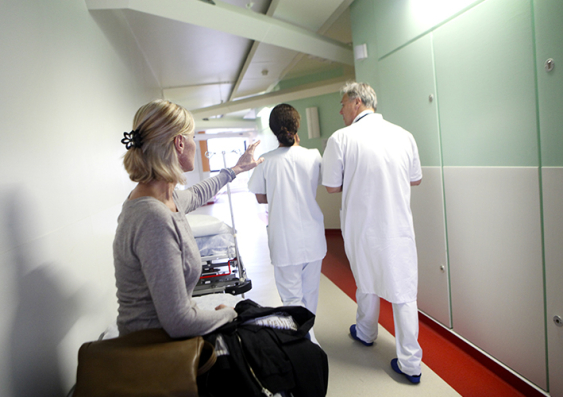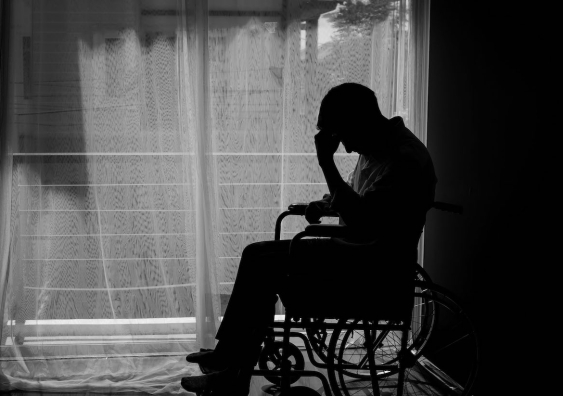The extent of neglect and abuse suffered by people with disabilities in prison and custody systems in Australia has been revealed.
People with disability╠řare subjected╠řto cruel, inhuman and degrading treatment in incarceration. Those are the findings of a new report led by researchers from ╗╩╣┌▓╩Ă▒ Sydney, which unveils the systemic and ongoing maltreatment and harm that occurs when people with disability╠řare detained╠řin Australia.
Vulnerable people are held in solitary confinement, are detained indefinitely, have their medications withheld, suffer physical and sexual assault, and are regularly humiliated, the report finds.╠řIt also uncovered the demeaning and dehumanising practices╠řthat people╠řwith╠řdisability╠řregularly experience in places of detention, including being strip searched and having to beg for sanitary products.
ÔÇťIÔÇÖm aware of disabled children put into solitary confinement and people with intellectual disability strapped into restraint chairs and injected with tranquillisers,ÔÇŁ says Mr Patrick McGee,╠řChurchill Fellow and Coordinator Australians for Disability and Justice, who is the first author of the report. ÔÇťThey are scared, they are fearful, there is no one to tell them what is happening or when it might end.ÔÇŁ
╠řshines a light on the lived experience of people with disability in institutional detention settings.╠řIt details the findings of a National Forum attended in 2023 by academics, researchers, and advocates to produce a blueprint for state and territory governments to safeguard people with disabilities in detention and protect them from institutional ill-treatment and abuse.
ÔÇťAustralia regularly detains young people and adults with disability every year,ÔÇŁ says Dr Maree Higgins, Senior Lecturer at the School of Social Sciences at ╗╩╣┌▓╩Ă▒ Arts, Design & Architecture, and co-author of the report. ÔÇťSome╠řare held╠řindefinitely; others cycle in and╠řout of prisons and other places of detention.
ÔÇťMany are subjected to traumatic, cruel, inhuman, and degrading treatment.ÔÇŁ
Media enquiries
For enquiries about this story and interview requests, please contact╠řBen Knight, News & Content Coordinator, ╗╩╣┌▓╩Ă▒ Arts, Design & Architecture.
Phone:╠ř(02) 9065 4915
Email:╠řb.knight@unsw.edu.au
ÔÇťMost Australians would be horrified to know the extent of the treatment meted out to vulnerable people in our detention centres,ÔÇŁ says ╗╩╣┌▓╩Ă▒ Professor Emerita Eileen Baldry AO, a co-author of the report.╠ř
The report was launched last week by Commonwealth Ombudsman,╠ř.╠ř
ÔÇťReports such as this are crucial for effective monitoring of detention environments. They help inform the work of oversight bodies such as my Office, what issues require closer scrutiny, and how monitoring could╠řbe done╠řbetter,ÔÇŁ Mr Anderson says.
Cruel, inhuman and degrading treatment
People with disability, particularly those with cognitive impairment and psychosocial disability, are dramatically overrepresented in detention. According to the , almost 39 per cent of people entering prison have a disability. Aboriginal and Torres Strait Islander people with disabilities also represent 32 per cent of the prison population.
Ms Taylor Budin, an Indigenous person with a disability and justice advocate with the Intellectual Disability Rights Service, has experienced humiliating treatment first-hand while in detention.
ÔÇťItÔÇÖs just not safe for people with disability in detention,ÔÇŁ Ms Budin says. ÔÇťI was vulnerable to╠řboth╠řdegrading treatment from the prisonÔÇÖs guards who treated me like a dog, but I was also humiliated and hurt by other prisoners.ÔÇŁ
Mr Phillip Jenkins, a disability and justice advocate, is also a person with╠řa disability who has lived experience of detention.╠ř
ÔÇťI soon learnt that I was a problem for wanting my health needs met,ÔÇŁ Mr Jenkins says. ÔÇťThis treatment leaves you without dignity,╠řit╠řexacerbates╠řyour vulnerability, and blatantly ignores your fundamental human rights.ÔÇŁ
Most Australians would be horrified to know the extent of the treatment meted out to vulnerable people in our detention centres.
Australian governments are signatories to the Convention on the Rights of Persons with╠řDisability and have╠řobligations to ensure that people with disability╠řare not deprived╠řof freedoms. In October 2022, the , citing a lack of cooperation from the authorities detaining people with disability.╠ř
Prolonged detention contributes to and exacerbates mental health problems. Many people in detention have traumatic pasts and poor care makes things worse.
ÔÇťThere is a lack of╠řbasic╠řservices,╠řhigh╠řrisk of verbal abuse, physical and sexual violence, and a lack of cultural safety,ÔÇŁ Mr McGee says. ÔÇťPeople deemed unfit for trial due to cognitive impairment may╠řbe detained╠řindefinitely.ÔÇŁ
Systemic reforms needed
Dr Higgins says it is vital to centre and acknowledge the lived experiences of those with╠řdisability╠řwho have experienced detention and develop a National Report Card to make a difference.╠ř
ÔÇťThis report is unique because little work has been done to give a prominent voice to those╠řdirectly affected,ÔÇŁ╠řDr Higgins says. ÔÇťItÔÇÖs╠řvital that we hear them and include them in the╠řdecision-making╠řprocess to find solutions that work.ÔÇŁ╠ř
The report details several recommendations for governments to protect people with disability in detention, including abolishing indefinite detention and╠řestablishing╠řa well-funded, independent╠řbody to advocate for forensic patients and their families.╠ř
ÔÇťThe╠řrecurring╠řmessage╠řwas the need for greater oversight, monitoring, and accountability in places of detention,ÔÇŁ Dr Higgins says. ÔÇťWe have a proactive obligation to prevent people with a disability╠řsuffering╠řill-treatment╠řwhich╠řextends to places of detention.ÔÇŁ╠ř
Legislative reform to address shortcomings of the legal system, including ensuring access to Medicare in detention and legislating requirements for appropriate medical and disability assessment for all people entering detention, was also recommended.╠ř
ÔÇťThis is a call for care and love that is desperately missing from the system to date,ÔÇŁ Dr Higgins says. ÔÇťWe hope this report stimulates meaningful action and fosters a deeper understanding╠řboth╠řof what is happening and what must change.ÔÇŁ
Related stories
-

Crisis communication saves lives ÔÇô but people with disability often arenÔÇÖt given the message
-

'They treat you like an it': people with intellectual disability on seeing medical professionals
-

Nearly a third of patient deaths in mental health wards potentially avoidable: study
-

The disability royal commission delivers its findings today. We must all listen to end violence, abuse and neglect






